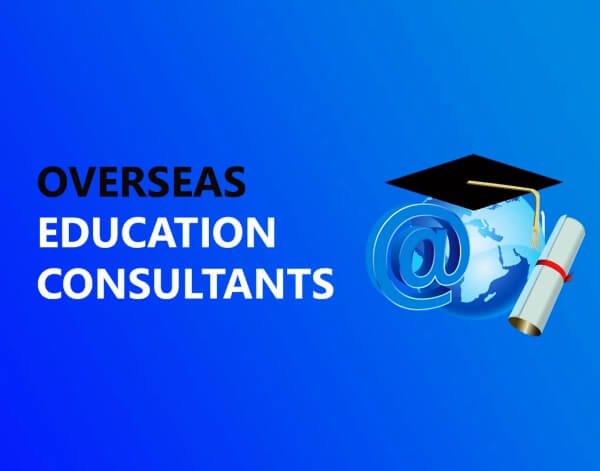Do you want to study overseas but are intimidated by the application procedure? Aspiring international students have no fear! Consult an overseas education specialist to help you make sense of the fascinating but confusing world of studying abroad.

Overseas Education Consultants Meaning
Professionals who specialize in helping students apply to institutions abroad are known as overseas education consultants. They assist students in navigating the frequently challenging world of foreign education by serving as mentors and advisors.
Here’s a breakdown of what overseas education consultants do:
Streamlining the Application Process: Consultants can help students with various aspects of applying to universities abroad, including:
- Identifying suitable programs based on academic background, interests, and career goals.
- Gathering application materials like transcripts, letters of recommendation, and essays.
- Proofreading and editing application essays to ensure they are strong and impactful.
- Meeting deadlines for applications and required documents.
- Knowledge of Various Countries: A lot of advisors have specialized in one or more nations, providing an in-depth understanding of the prerequisites for entering universities, the procedures for obtaining visas, and the subtleties of local culture.
- Guidance on Standardized examinations: A few consultants may provide guidance or materials to help with the preparation of standardized examinations, such as the GMAT and GRE, which are necessary for many overseas programs.
- Financial Aid & Scholarship Assistance: To help make studying abroad more affordable, consultants can assist students in looking into financial aid and scholarship alternatives.
- Advice on Visas: Applying for a visa can be a difficult procedure. Consultants can offer advice on the precise paperwork required, when to submit them, and how to prepare for possible interviews.
Related: Best Scholarship Abroad For International Student

Why Take Into Account An Advisor for Overseas Education?
- Professional Advice: Take use of the skills and knowledge of experts who are knowledgeable about the most recent requirements for admission, available scholarships, and visa procedures for different nations.
- Simplified Application Process: Advisors can assist you in choosing appropriate programs, compiling application documents, and writing essays that effectively highlight your qualifications to colleges.
- Less Stress and Saved Time: You may concentrate on your studies and standardized testing by letting the consultant handle the minute aspects.
- Help with Visas: Get insightful advice on how to handle the frequently challenging student visa application procedure for the nation of your choice.
How to Choose the Best Consultant for Overseas Education:
- Reputation and Experience: Find out about the consultant’s background, degree of achievement, and areas of expertise. Seek out advisors who have a track record of assisting students in realizing their aspirations for their international studies.
- Services Offered: Ensure the consultant offers services that align with your needs. Do you need help with university shortlisting, application essays, or visa guidance?
- Cost Transparency: Be upfront about your budget and inquire about the consultant’s fee structure. Some offer hourly rates, while others have fixed packages.
- Location and Accessibility: Consider whether in-person consultations are important to you, or if you’re comfortable with online communication.
Top Tips for a Successful Consultation:
- Prepare: Get your transcripts, exam scores (if applicable), and a clear idea of your academic interests and career goals before meeting with the consultant.
- Please feel free to ask any questions you may have about the application process, the programs that are offered, or living abroad.
- Maintain Open Communication: Have a real and open discussion with your consultant about your educational background, your strengths and weaknesses, and your need for financial support.
Related: Top 2024 Available Scholarships To Study Abroad

How To Become An International Educational Consultant
International educational consultants are essential in assisting students in navigating the challenges of studying overseas. The field of education is varied and fascinating. If you have a strong interest in learning and foreign exchange, this career path can be ideal for you. The following road map will help you in your journey to become an international education consultant:
Foundation for Academics:
- Bachelor’s Degree: A solid foundation can be established with a bachelor’s degree in a relevant field, such as business administration, international relations, education, or a particular subject.
- Consider a Master’s Degree: While not mandatory, a master’s degree in education, international education, or a related field can enhance your expertise and credibility. Look for programs with a focus on international student recruitment or study abroad advising.
Gain Relevant Experience:
- Education Sector Experience: Working in the education sector, such as schools, universities, or educational non-profits, can provide valuable experience in understanding student needs and curriculum development.
- International Exposure: Living, studying, or volunteering abroad can broaden your perspective and equip you with firsthand knowledge of different education systems and cultural nuances.
Build Your Knowledge Base:
- Stay Updated: The international education landscape is constantly evolving. Stay current on admission requirements, scholarship opportunities, visa processes, and trends in different countries. Consider attending industry conferences and workshops.
- Standardized Testing: Familiarize yourself with standardized tests required for international programs like the GMAT, GRE, or TOEFL. Some consultants might offer guidance on these tests.
Develop Essential Skills:
- Communication & Interpersonal Skills: Excellent communication and interpersonal skills are paramount for building rapport with students, parents, and university representatives.
- Research & Analytical Skills: You’ll need strong research skills to stay updated on program offerings, scholarship opportunities, and visa regulations. Analytical skills are crucial for evaluating student profiles and recommending suitable programs.
- Marketing & Sales Skills: Understanding marketing principles can help you build your client base and attract students seeking your consulting services.
Certifications (Optional):
While not mandatory, some certifications can enhance your credibility:
Independent Educational Consultant Association (IECA): Offers a Certified Educational Consultant (CEC) designation after completing their training program and passing an exam.
American International Recruitment Council (AIRC): Provides the Certified International Student Adviser (CISA) designation upon meeting specific requirements and passing an exam.
Build Your Network:
- Connect with Industry Professionals: Network with established international educational consultants, attend industry events and connect with university admissions officers to expand your knowledge and build valuable relationships.
- Develop Partnerships: Collaborate with educational institutions, travel agencies, or student organizations to expand your reach and attract potential clients.
Start Offering Consultancy Services:
- Create a Business approach: To build a long-lasting consulting firm, list your target market, services provided, pricing strategy, and marketing approach.
- Establish a Robust Online Presence: Construct a polished website that highlights your qualifications, offerings, and clientele. Make use of social media channels to interact with potential students and position yourself as an authority in the area.
Becoming a successful international educational consultant involves commitment, lifelong study, and a love of helping students realize their academic goals overseas.
Extra Advice:
- Create a Niche: To set yourself apart from the competitors, think about focusing on a certain area, educational program, or student population.
- Make an offer Superb Customer Service: Developing a good reputation and getting recommendations depend on earning the trust of your clients and going above and beyond their expectations.
- Remain Ethical: Uphold the highest moral standards, give students’ needs top priority, and deliver truthful information with honesty and openness.
Related: Best Nursing Scholarships In 2024

Roles Of An Overseas Consultant
Overseas education consultants act as expert guides for students navigating the complexities of applying to universities abroad. Here’s a breakdown of the key roles they play:
Streamlining the Application Process:
- Program Selection: Consultants leverage their knowledge of universities and programs across the globe to help students identify suitable options that align with their academic background, interests, and career aspirations.
- Application Materials: They guide students in gathering necessary documents like transcripts, letters of recommendation, essays, and standardized test scores (if required).
- Application Review & Editing: Consultants can review application essays, offering feedback and guidance to ensure they are strong and impactful, and highlight the student’s unique strengths.
- Meeting Deadlines: They help students stay organized and meet application deadlines for universities and scholarship opportunities.
Expertise in International Education:
- Country-Specific Knowledge: Many consultants specialize in specific countries or regions. They possess in-depth knowledge of university admission requirements, visa application processes, and the cultural nuances of their focus areas.
- Scholarship & Financial Aid Advice: To make studying abroad more affordable, consultants can assist students in looking into financial aid and scholarship programs. They can also offer guidance on living expenses abroad and budgeting.
Preparing for Standardized Tests (Optional):
- Exam Selection and Importance: Some consultants may provide guidance or materials for getting ready for standardized examinations that are necessary for admission to particular institutions, like the GMAT in business programs or the GRE in graduate school.
Help with Visas:
- Advice on the Visa Process: Depending on the nation, applying for a visa can be a difficult and varied process. Consultants can offer helpful advice on necessary paperwork, due dates, interview preparation, and handling any complications.
Extra Assistance Services (May differ based on consultant):
- Pre-Departure Briefing: Some consultants provide briefings to students to get them ready for the expectations of their chosen destination’s academic program, housing, and culture.
- Post-Arrival Support: Once students go overseas, a small number of consultants may provide some kind of assistance, such as connecting them with local resources or student networks.
Consultants for overseas education might be helpful allies on your study abroad adventure. You can improve your chances of getting accepted into the program of your dreams and starting a life-changing educational journey by taking advantage of their knowledge and advice.
Related: Fastweb Scholarships: Unlocking Scholarship Success In 2024

Financial Commitments By UK Universities
UK universities, like most institutions of higher education, have various financial commitments they need to manage. Here’s a breakdown of some key areas:
Operational Costs:
- Staff Salaries: A significant portion of a university’s budget goes towards faculty and staff salaries, benefits, and pensions.
- Facilities Management: Maintaining buildings, classrooms, libraries, laboratories, and other facilities incurs ongoing costs for utilities, repairs, and upkeep.
- Technology Infrastructure: Universities invest heavily in technology infrastructure, including computer labs, software licenses, cybersecurity measures, and educational technology resources.
- Administrative Expenses: General administrative costs cover areas like human resources, legal services, marketing and recruitment, and administrative staff salaries.
Academic Programs:
- Faculty Research: Many universities support faculty research through grants, funding for equipment and lab supplies, and research assistantships.
- Program Development & Maintenance: Updating curriculums, acquiring new resources for specific programs, and maintaining accreditation standards require ongoing financial investment.
- Library Resources: Universities need to maintain extensive library collections (physical and digital), including subscriptions to academic journals and databases.
Student Services:
- Student Support Services: Financial aid programs, academic advising, career counseling, disability services, and mental health resources all require dedicated funding.
- Campus Facilities for Students: Maintaining student dormitories, sports facilities, student centers, and other amenities necessitates ongoing financial commitments.
Debt and Borrowing:
- Capital Projects: Building new facilities, renovating existing ones, or upgrading infrastructure might require universities to take on debt through loans or bonds.
Revenue Streams for UK Universities:
- Student Fees: Tuition fees from domestic and international students are a major source of income for UK universities.
- Government Funding: The UK government provides financial support to universities based on various factors, including student enrollment and research activities.
- Research Grants: Universities compete for research grants from government agencies, private foundations, and other funding bodies.
- Donations & Philanthropy: Alumni donations, charitable contributions, and endowments can provide a significant source of income for some universities.
- Commercial Activities: Some universities generate revenue through commercial activities like renting out facilities, licensing intellectual property, or offering continuing education programs.
UK Universities’ Financial Sustainability:
- Impact of COVID-19: As a result of campus closures and a decline in enrolment of overseas students, the COVID-19 pandemic had a major financial impact on universities.
- Government Policy: Regulations governing tuition costs and government financing programs have a significant impact on the financial stability of institutions.
- Cost-Control Measures: To preserve their financial sustainability, universities may need to put cost-control measures in place, such as cutting back on administrative costs or combining programs.
Related: How To Communicate Confidence: Body Language Bonanza
Conclusion
Investing in an international education consultant might be a good decision, particularly if you want to attend elite universities abroad. With their help and advice, you can improve your chances of getting into your ideal program and embarking on a transformative educational experience.
Take the first step toward your foreign education aspirations today. Find a reputable international education consultant and let the adventure begin!

